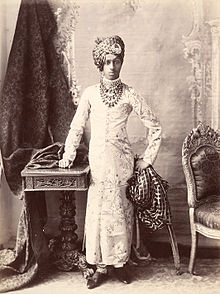Maharaja Sir Sardar Singh Bahadur GCSI (11 February 1880 – 21 March 1911) was the Maharaja of Jodhpur State from 11 October 1895 till his death on 20 March 1911.[1][2]
| Sardar Singh | |
|---|---|
| Maharaja of Jodhpur | |
 Sardar Singh in 1896 | |
| Maharaja of Jodhpur | |
| Tenure | 11 October 1895 – 21 March 1911 |
| Predecessor | Jaswant Singh II |
| Successor | Sumer Singh |
| Born | 11 February 1880 Jodhpur, Jodhpur district, Rajasthan, India |
| Died | 21 March 1911 (aged 31) |
| Spouse | Lakhsman Kanwar of Bundi Kishor Kanwar of Mewar |
| Issue | Sumer Singh (b.1898) Marudhar Kanwar, Maharani of Jaipur (b.1899) Suraj Kanwar, Maharani of Rewa (b.1901) Umaid Singh (b.1903) Ajit Singh (b.1907) |
| House | Rathore-Jodhpur |
| Father | Maharaja Sir Jaswant Singh II of Jodhpur |
| Mother | Maharani Puariji Bijay Kanwar |
| Religion | Hinduism |
He succeeded his father Maharaja Sir Jaswant Singh II in 1895. He reigned under the Regency of his uncle until he came of age and was invested with full ruling powers, at Mehrangarh, Jodhpur, 18 February 1898. But within a short period of attaining his ruling powers, he began to spend state funds on an extraordinary rate and neglected his duties in favor of pleasure, thereby depleting the state revenues and gradually causing the administration to grind to a near halt. The British Indian officials, eventually intervened in 1903 and deprived him of his ruling powers and ordered him to refrain from interfering in the active work of his ministers and requested that he reside outside the state at Panchmarhi. He had certain restricted powers restored to him and was permitted to return to Jodhpur 8 November 1905. Further powers were restored to him in 1906, with full ruling powers being finally restored in 1908.[citation needed] He was created KCSI in 1908 and GCSI in 1910.[citation needed] He was a noted polo player.[3]
He died on 21 March 1911, and was succeeded by his son Sumer Singh.[citation needed]
References
edit- ^ Tanuja Kothiyal (14 March 2016). Nomadic Narratives: A History of Mobility and Identity in the Great Indian Desert. Cambridge University Press. p. 290. ISBN 978-1-107-08031-7. Retrieved 30 October 2016.
- ^ George S. Cuhaj (1 July 2015). Standard Catalog of World Coins 2016: 1901–2000. Krause Publications. p. 1104. ISBN 978-1-4402-4409-4. Retrieved 30 October 2016.
{{cite book}}:|work=ignored (help) - ^ Jaisal Singh (2007). Polo in India. New Holland Publishers. p. 33. ISBN 978-1-84537-913-1. Retrieved 30 October 2016.